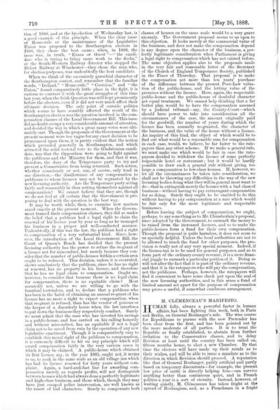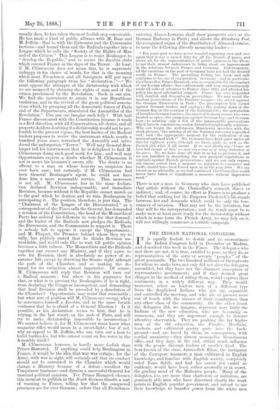M. CL]IMENCEAU'S MANIFESTO.
HUMAN folly, always a powerful factor in human affairs, has been fighting this week, both in Paris and Berlin, on General Boulanger's side. The wise course for Republicans to pursue with the new Pretender has been clear from the first, and has been pointed out by the more moderate of all parties. It is to treat the Republic as finally established, to abstain from further irritation to the Conservative classes, and to delay Revision at least until the country has been called on, fifteen months hence, to elect a new Chamber. By that time the electors will have made up their minds as to their wishes, and will be able to issue a mandate as to the direction in which Revision should proceed. A reputation like that of General Boulanger, partly artificial and partly based on temporary discontents—for example, the present low price of cattle is directly helping him—can survive anything better than continuous quiet, and in French politics a year is a sort of eternity. Instead, however, of waiting quietly, M. ChSmenceau has taken fright at the spread of Boulangism, and, as a Frenchman in a fright usually does, he has taken the most foolish step conceivable. He has made a kind of public alliance with M. Ranc and M. Joffrin—that is, with the Extremist and the Communist factions—and bound them and the Radicals together into a League which he calls the " Society of the Rights of Man and of the Citizen." This League is to resist Boulanger, to " develop the Republic," and to revive the Jacobin clubs which covered France in the days of the Terror. At least, if M. Clhaenceau does not mean this, he is supremely unhappy in his choice of words, for that is the meaning which most Frenchmen and all foreigners will put upon the following paragraph from his " declaration :"—" We must oppose the attempts of the dictatorship with which we are menaced by claiming the rights of man and of the citizen proclaimed by the Revolution. Such is our aim. We find the instrument to attain it in our Republican traditions, and in the revival of the great political associa- tions which, by grouping all the democratic forces of Paris and of the Departments, stimulated the Assemblies of the Revolution." Can any one imagine such folly ? With half France discontented with the Constitution because it tends in a Red direction, with all Conservatives, all clerics, and all property-holders doubting if a dictatorship would not be pre- ferable to the present regime, the best known of the Radical leaders proposes to revive the instrument which, nearly a hundred years since, terrorised the Assembly and intro- duced the unforgotten " Terror." Well may General Bou- langer tell his interviewers that he is delighted to find M. Cl6menceau doing such good work for him ; and well may Opportunists express a doubt whether M. Clemene,eau is not in secret his kinsman's sworn ally. The doubt is an affront to a man on whose honesty no suspicion has ever been cast ; but certainly, if M. Cl6menceau had been General Boulanger's agent, he could not have done him a more seasonable service. This, moreover, is not all. M. Cl6menceau has in the same declara- tion declared Revision indispensable, and immediate Revision, because without it the Republic cannot march on to the goal which he desires, and so ruin Boulangism by anticipating it. The position, therefore, is just this. The " Chairman of the League of the Discontented," as a correspondent of the Times calls the General, has demanded a revision of the Constitution ; the head of the Monarchical Party has ordered his followers to vote for that demand ; and the leader of the Radicals now pledges the Radicals, the Extremists, and the Communists to support it. There is nobody left to oppose it except the Opportunists ; and M. Floquet, the Premier, behind whom they try to rally, has publicly stated that he thinks Revision un- avoidable, and would only like to wait till public opinion becomes a little calmer. The Monarchists and the Radicals together can overset any Ministry, and if they agree to vote for Revision, there is absolutely no power of re- sistance left, except by throwing the Senate right athwart the path of the Chamber, and so making the de- mand for its extinction almost imperative. Of course, M. Cl6menceau will reply that Revision will turn out a Radical measure ; but where is his guarantee for that, or what is to prevent the Boulangists, if he is right, from declaring the Congress incompetent, and demanding that final Revision shall be preceded by a dissolution of the Chamber ? Opportunists may resist that reasonably ; but what sort of position will M. CMmenceau occupy when he announces himself a Jacobin, and in the same breath confesses that he is afraid of a General Election ? Is it possible, as his declaration seems to hint, that he is relying, in the last resort, on the mob of Paris, and will try to make dictatorship impossible by insurrection ? We cannot believe it, for M. Cl6menceau must know what magazine rifles would mean in a street-fight ; but if not, why an appeal to M. Joffrin, who can turn out a host to build barricades, but who cannot count on five votes in the Assembly itself ?
M. Cl6menceau, however, is hardly more foolish than Prince Bismarck. If anything could help Boulangism in France, it would be the idea that war was certain; for the Army, with war in sight, will certainly ask that its conduct should not be entrusted to the Chamber which would change a Ministry because of a defeat—recollect the Tonquinese business—and dismiss a successful General for unsound political opinions. Yet Prince Bismarck chooses this moment to publish in the North German Gazette a sort of warning to France, telling her that the conquered provinces are for ever German ; orders that all Frenchmen entering Alsace-Lorraine shall show passports vises at the German Embassy in Paris ; and allows the Strasburg Post, the recognised organ of the Statthalter of Alsace-Lorraine, to issue the following directly menacing leader :- " For years past we have never wearied repeating over and over again that it was a sacred duty for all the friends of peace, and above all, for the representatives of public opinion in the Press, to use their utmost endeavours to bring about an improvement in the relations between France and Germany. Unfortunately, all the exertions on the part of Germany have not had the desired result in France. The prevailing feeling has been, and still continues to be, one of exasperation. Germany—and in particular the Chancellor, Prince Bismarck, who is responsible for the conduct of our foreign affairs—has continuously and very magnanimously made all sorts of advances to France since 1870, and afforded her policy the most substantial support. Franco has over responded with churlish and discourteous proceedings. We may recall the insolent provocations of the Patriotic League ; the attack against the German Turnverein in Paris ; the proscription lists issued against German traders and employes; the tearing down of the German flag on the occasion of the National fete; the molestation of harmless German tourists ; the arrest of German savants who were treated as spies ; the campaign against German boys and German beer—to mention only a few of the innumerable provocations which have in constant succession disturbed neighbourly relations. Who can forget the well-known Ministerial speeches, with the stock phrases, ' the uniting of all the National forces for a specified end,' and ` the appropriate moment for the realisation of our never-abandoned wish ?' We Germans have kept quiet under all this for eighteen years, although we know, quite as well as the French did, what it all meant. If we now finally say, ' Come, we have had enough of this,' no man can (excuse us of being disturbers of the peace. No, we have done all that in us lay to preserve it, and we are justified in describing the new passport regulations as reprisals against French provocations; and we can only express our sincere sorrow that a measure so injurious to commerce and traffic should have been forced upon us in the year 1888. We say forced on us advisedly, as we feel convinced the Chancellor would never have taken so significant a measure without imperative need."
There is not a man in Germany who dare have published that article without the Chancellor's consent, direct or indirect ; and, of course, its effect in France is to produce a belief that nothing but the Emperor Frederick's life stands between her and demands which could be only the fore- runners of invasion. That may not be the intention, but that will be the interpretation ; and its result must be to make men at least more ready for the dictatorship without which in some form the French Army, we may rely on it, will not willingly commence a terrible campaign.



































 Previous page
Previous page